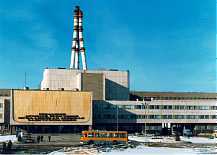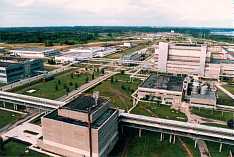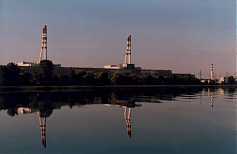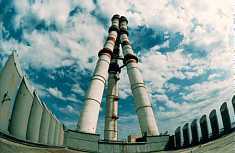 |
Vol 1, No 9, 23 August 1999
|
|
|
 N U C L E A R P O W E R:
N U C L E A R P O W E R:
Lithuania's Nuclear Dilemma Mel Huang Lithuania is faced with a difficult decision at this stage of its development: give up its primary power source for a faster road to Brussels or remain self-sufficient and risk incurring further wrath from the European Commission. What is being referred to here is Lithuania's nuclear dilemma and, specifically, the Ignalina Nuclear Power Plant. The European Commission wants Lithuania to implement an early shutdown timetable for the plant, but how will the world's most nuclear-dependent country deal with such an ultimatum?
First of all, it is not as simple as turning off the switch. As Ignalina generates over 85 percent of the electricity produced in Lithuania, the first question to surface would be where to find new sources of electricity. Unlike Estonia with its plentiful oil shale supply, Lithuania is not blessed with natural energy resources; a shutdown of Ignalina would be tantamount to full dependency on a foreign supplier, which, for a developing country, could prove disastrous. Lithuania has already experimented with the import of heavy fuel oils and even the environmentally disastrous Orimulsion for use in its other power plants, but further reliance on such imported fuels could prove to be financially and environmentally catastrophic in the long term. Lithuania claims that if the Ignalina plant is to be shut down early, the country needs more funds from international organisations. One of the hottest topics in Vilnius today is the draft energy strategy, which will no doubt include the fate of Ignalina. Earlier versions of the draft envisioned two possibilities for Ignalina: early shutdown or no early shutdown. The plan stressed that an early shutdown, scheduled for 2005, had to be accompanied by funding support from international organisations, such as the EU. The other alternative is to let the two reactors live out their design lifetime, which could include re-channelling and extension of the timetable.
Another serious challenge to an early shutdown is the liberalisation of the EU energy market. A project is currently under development to connect the Lithuanian and Polish power grids, which would enable Lithuania to export the millions of watts of surplus power it produces to the more reliable European market. Currently, this power is being exported to Belarus, which has accrued a debt of nearly USD 90 million. An ongoing scandal surrounding the deal continues to be played out on the front pages of Lithuania's papers. According to project heads, the potential linkage, along with the completion of energy liberalisation slotted for 2002, Ignalina could generate USD 150 million annually for Lithuania.
The reports on whether the EU has given Lithuania an ultimatum on early shutdown or not are, not surprisingly, contradictory. What is clear, however, is that this issue will remain a major obstacle to Lithuania's dreams of quick EU accession. Austria's recent anti-nuclear campaign aimed at EU candidate states clearly indicates Vienna's resolve to stamp out nuclear power. The European Commission even dangled a EUR100 million per annum carrot in return for Lithuania's agreement to a shutdown timetable. What began as a safety issue has boiled over into a question of sovereignty. Some harshly criticise the EU for dictating terms that could easily bankrupt Lithuania; others see Ignalina as a more symbolic sign of Lithuania's self-sufficiency. The decision on Ignalina's fate will be the biggest one to be made in Vilnius since the restoration of independence. But unlike that spirited occasion, in this case, whichever decision Vilnius makes will prove disastrous for Lithuania - either environmentally or fiscally. Mel Huang
For More Information (in English):
|
|
![]()
Copyright (c) 1999 - Central Europe Review and Internet servis, a.s.
All Rights Reserved
 To many in the region and around Europe, the name Ignalina sparks fearful memories of Chornobyl (that's Chernobyl for the Russophiles). Most articles in the European press focus on a single point: the fact that the reactors at Ignalina are of the RBMK-2 model, the same ones that caused the catastrophe in Ukraine over a decade ago. Fears over the reactor's safety have created a stumbling block on Lithuania's road to EU membership. But what would Ignalina's early shut down mean for Lithuania?
To many in the region and around Europe, the name Ignalina sparks fearful memories of Chornobyl (that's Chernobyl for the Russophiles). Most articles in the European press focus on a single point: the fact that the reactors at Ignalina are of the RBMK-2 model, the same ones that caused the catastrophe in Ukraine over a decade ago. Fears over the reactor's safety have created a stumbling block on Lithuania's road to EU membership. But what would Ignalina's early shut down mean for Lithuania? The idea of an early shutdown has not met with a universally warm welcome within Lithuania's developing economy. Some believe that with additional safety fittings and re-channelling, Ignalina's life can be extended beyond its original design, perhaps as far as 2025. According to many of the plant's supporters, this would be the least expensive route to take. In a surprising public show of support, a November 1998 poll conducted by Vilmorus indicated that support for Ignalina stood at a solid 80 percent - higher than the 68 percent in favour of the EU as reported by the The Baltic Times.
The idea of an early shutdown has not met with a universally warm welcome within Lithuania's developing economy. Some believe that with additional safety fittings and re-channelling, Ignalina's life can be extended beyond its original design, perhaps as far as 2025. According to many of the plant's supporters, this would be the least expensive route to take. In a surprising public show of support, a November 1998 poll conducted by Vilmorus indicated that support for Ignalina stood at a solid 80 percent - higher than the 68 percent in favour of the EU as reported by the The Baltic Times. The loss of Ignalina at a time when the energy market in Europe is just opening up would deprive Lithuania of a major source of revenue; instead, it would mean spending millions, just to keep the lights on at home. The Swedish firm Grufman Reje estimated that an early Ignalina shutdown would cost Lithuania USD three to four billion in revenues over two decades.
The loss of Ignalina at a time when the energy market in Europe is just opening up would deprive Lithuania of a major source of revenue; instead, it would mean spending millions, just to keep the lights on at home. The Swedish firm Grufman Reje estimated that an early Ignalina shutdown would cost Lithuania USD three to four billion in revenues over two decades.